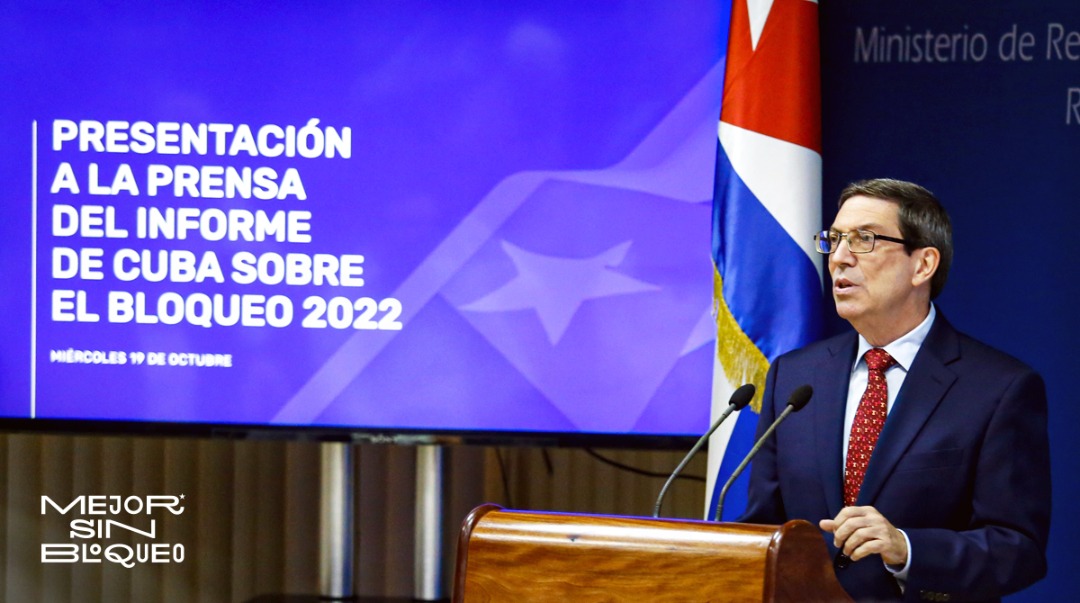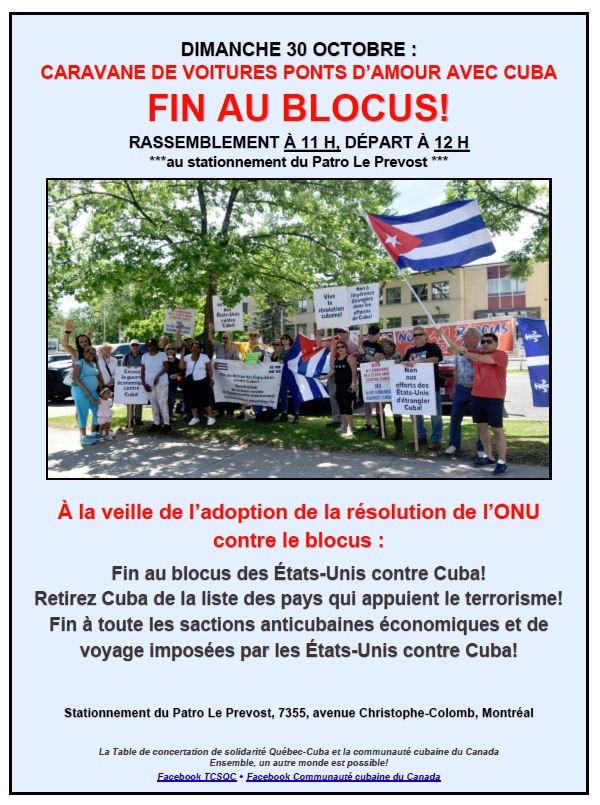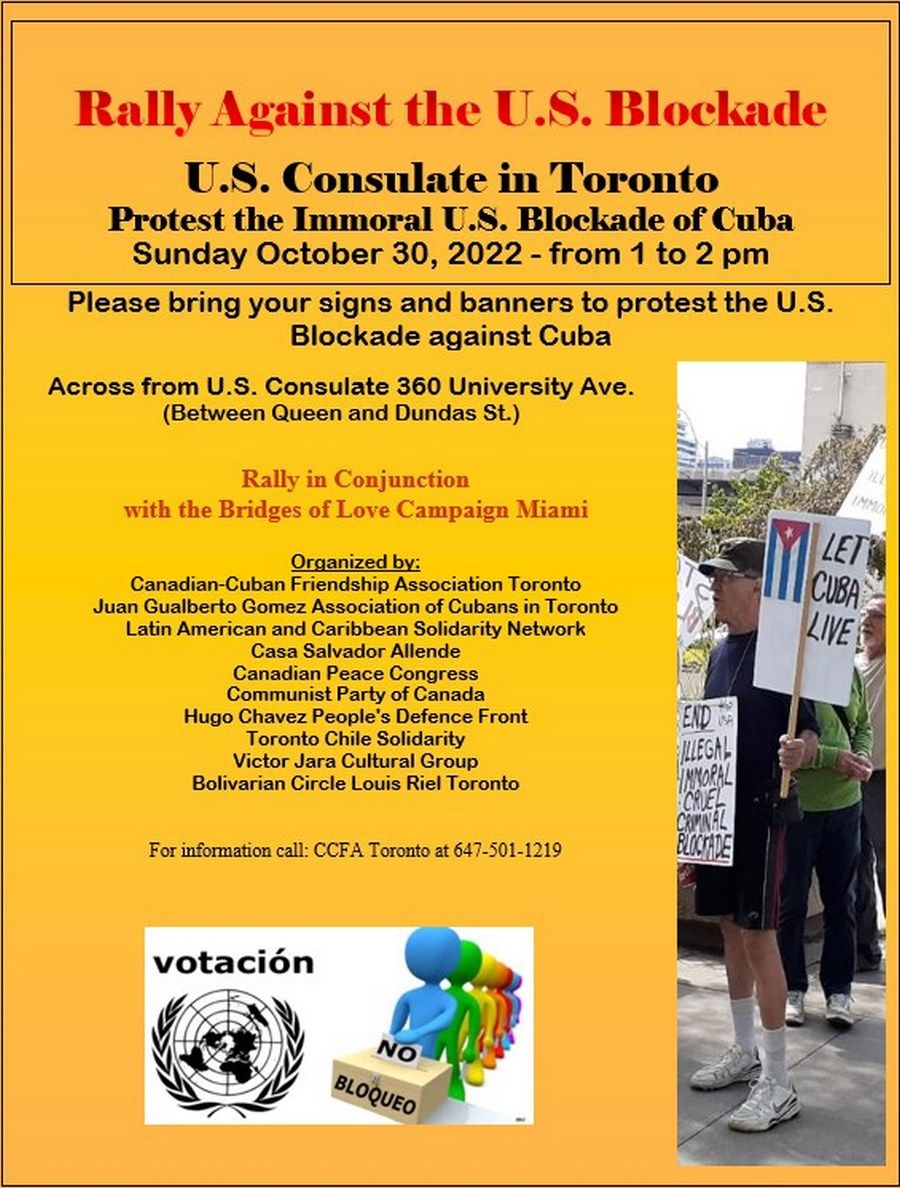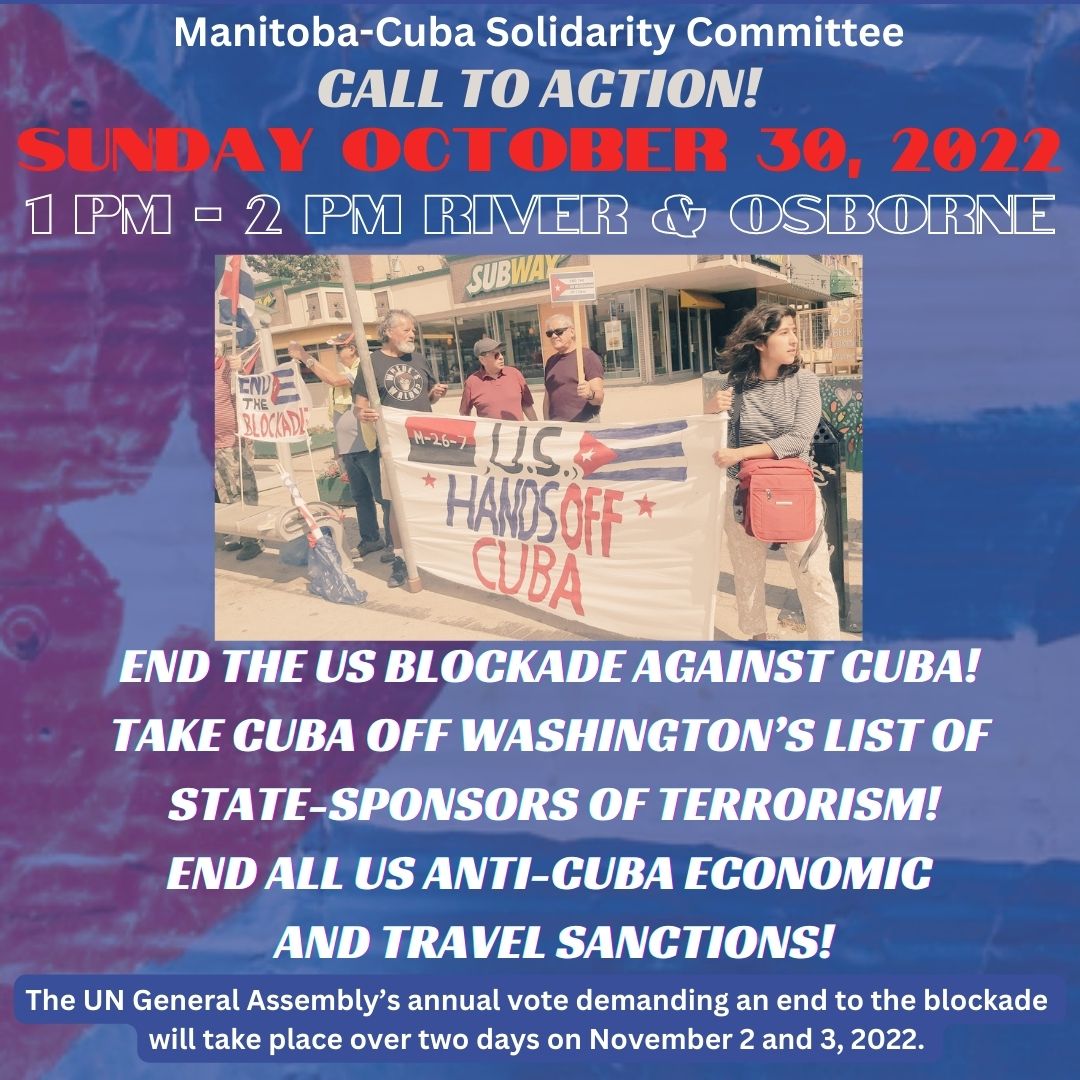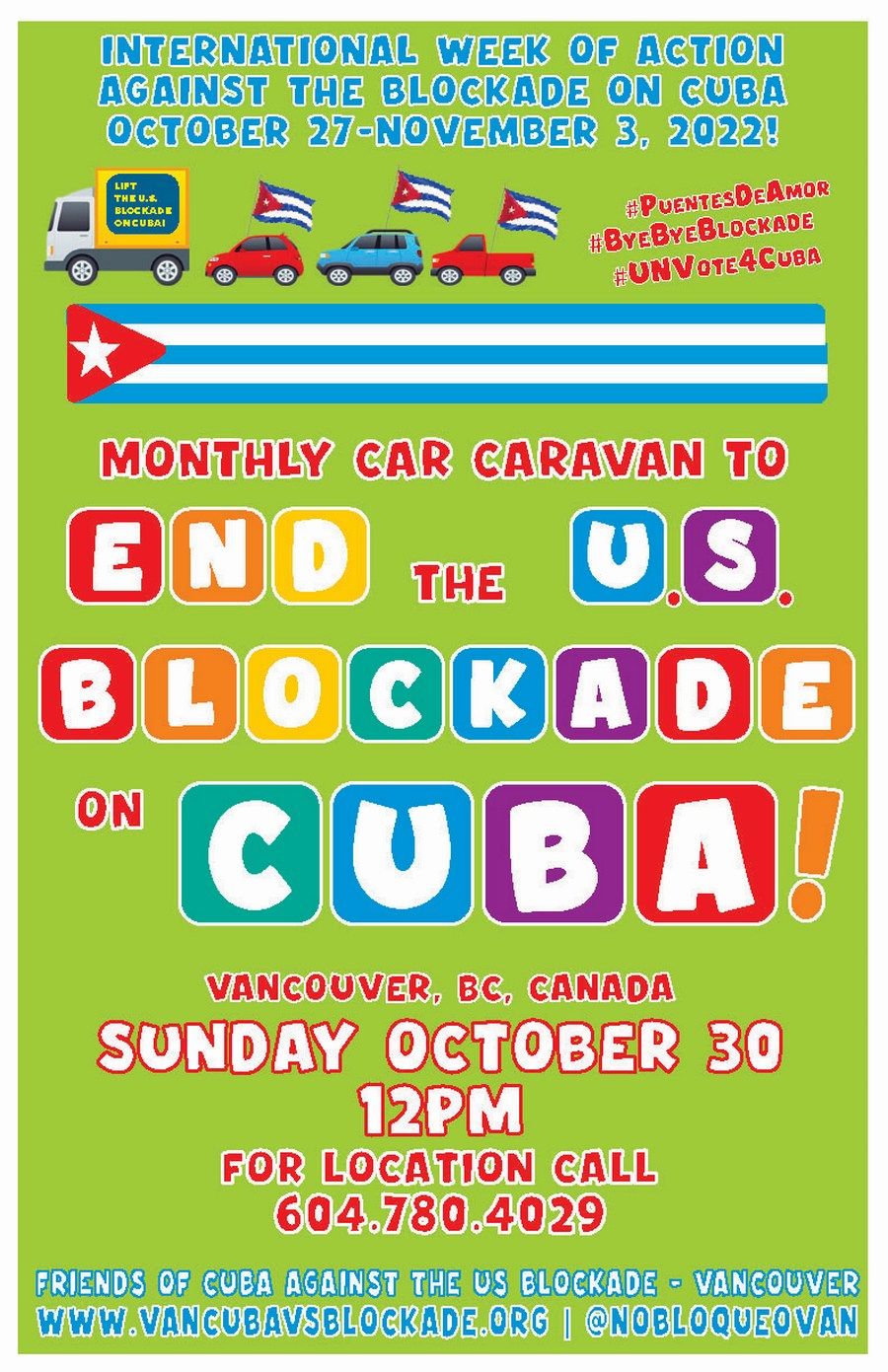October 28, 2022 - No. 37
Cuba Presents Report on Impact of U.S. Blockade
"The World Would Be Better Without the Blockade Against Cuba" Foreign Minister Says
• Events in Support of Cuba and UN Vote on U.S. Blockade
Cuba Presents Report on Impact of U.S. Blockade
"The World Would Be Better Without the Blockade Against Cuba" Foreign Minister Says
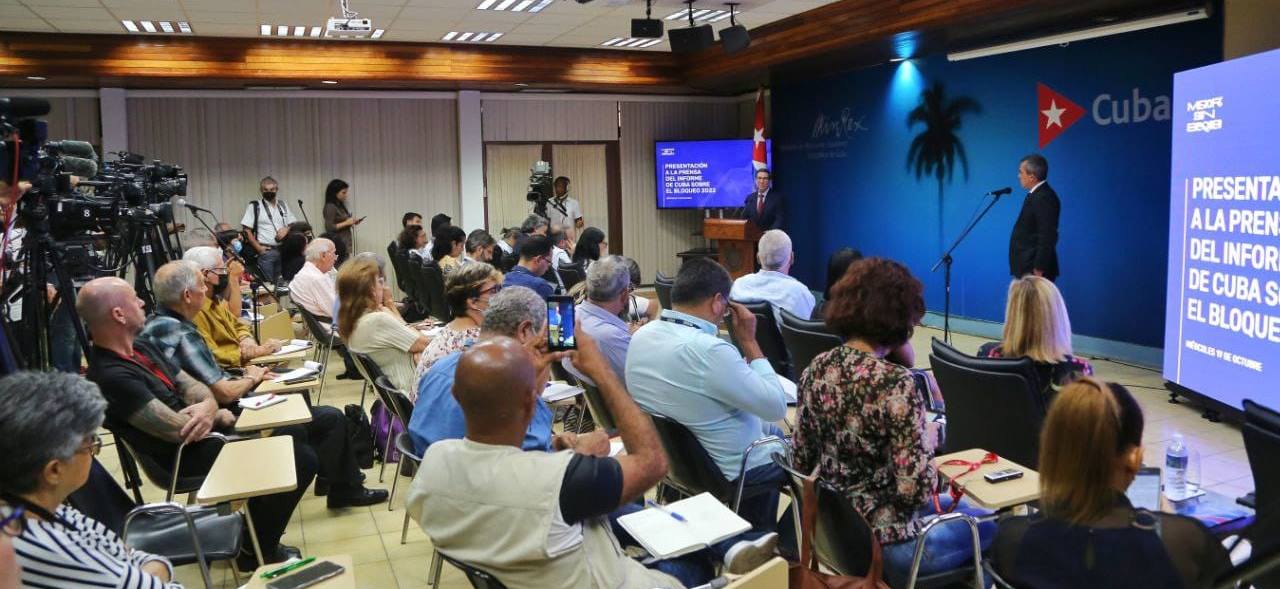
Report to the national and foreign media by Cuban Minister of
Foreign Affairs Bruno Rodríguez Parrilla, October 19, 2022.
On November 2 and 3, the United Nations General Assembly (UNGA) will consider for the 30th time the agenda item "Necessity of ending the economic, commercial and financial blockade Imposed by the United States of America against Cuba."
As it has done every year since 1962, Cuba will present its "Update to the Report of Cuba on Resolution 75/289 of the United Nations General Assembly entitled 'Necessity of ending the economic, commercial and financial embargo imposed by the United States of America against Cuba' (August 2021 -- February 2022)." The 29th vote, taken June 23, 2021, resulted in 184 countries voting in favour of the resolution, only two voting against it (United States and Israel), and three abstaining (Brazil, Colombia and Ukraine).
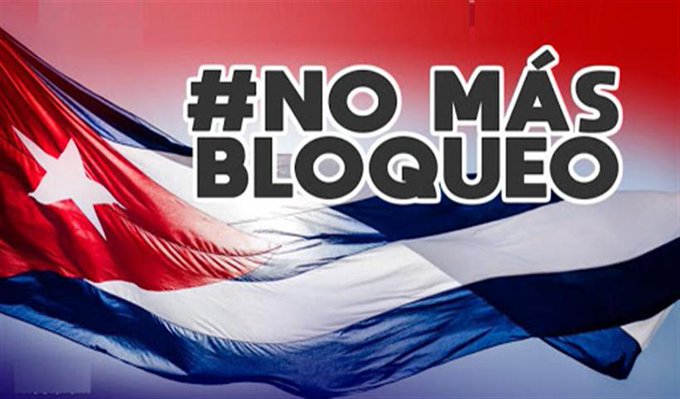 On
October 19 Cuban Minister of Foreign Affairs Bruno Rodríguez
Parrilla
outlined to the diplomatic corps in the country, and to the
national
and foreign media, the update Cuba will present to the UNGA.
On
October 19 Cuban Minister of Foreign Affairs Bruno Rodríguez
Parrilla
outlined to the diplomatic corps in the country, and to the
national
and foreign media, the update Cuba will present to the UNGA.
He pointed out that this year's debate at the UN is taking place in a special context -- one marked by the devastating effects of Hurricane Ian, by the effects of a multidimensional global crisis that includes an international economic crisis and an imminent threat of a global recession, food crisis, energy crisis, health crisis, and others. It also comes at a time of unprecedented intensification of the blockade, starting from the second half of 2019 based on the policy of the previous Republican government of the U.S. of economic suffocation, of economic war, of deliberately seeking the collapse of the Cuban economy and the country, without measuring the serious humanitarian consequences or the impacts of that objective, which will never be fulfilled, he said, but which would undoubtedly lead to unpredictable consequences.
Rodríguez said losses caused by the blockade between August 2021 and February 2022 were in the order of $3.8 billion, a record amount for such a short period of time. The Gross Domestic Product of Cuba, according to very conservative data, he said, could have grown, despite the adverse circumstances facing the economy, by 4.5 per cent in that period had those measures not been applied.
In 60 years, at current prices, he said, the accumulated
damages add
up to $154.2 billion. This is an exorbitant figure for a small
economy
like Cuba's, without great natural resources, insular,
underdeveloped,
he said. But, when quantifying the damage by taking into account
the price of the U.S. dollar against the value of gold on the
international market, the amount comes to more than $1.391
trillion.
Some other facts he provided were:
- Cuba cannot acquire, anywhere, in any way, technologies, equipment, parts, pieces, digital technologies or software, which have 10 per cent U.S. components, which has an impact as serious as that of the lack of foreign currency to guarantee supplies.
- Dozens and dozens of banks deny services to Cuba for fear of incurring U.S. fines. Between January 2021 and February 2022, foreign banks reported 642 refusals of service to Cuba in this regard. Dozens of diplomatic missions, of Cuban embassies today lack banking services.
- During the height of the pandemic the U.S. allowed temporary exemptions from its unilateral coercive measures to dozens of sanctioned countries, which allowed them to purchase vaccines, oxygen and ventilators. No such exemption was allowed for Cuba.
The update explains that by keeping Cuba on its List of State Sponsors of Terrorism the U.S. has reinforced the deterrent and intimidating impact of the blockade and Cuba's difficulties engaging in international trade and financial operations of all kinds. This represents "incalculable costs and consequences" for the Cuban people and economy.
Another aggravating factor this year's update refers to is that on top of its economic war, the U.S. government has unleashed a pernicious media campaign in an attempt to destabilize the country. Lies, slander, manipulation of data, images and a host of other methods of unconventional warfare have been used in hopes it will lead to "regime change" which it calls a clear violation of the principle of non-interference in the internal affairs of countries:
"They placed our children, youth and artists at the centre of the media barrage. They promoted artificial leaders, fabricated pretexts for the rehearsal of a humanitarian intervention, encouraged irregular migration and displayed a misleading narrative in order to position the false image of a government in crisis, repressive and unstable, incapable of responding to the demands of its population."
Cuba's Foreign Minister Rodríguez said, "In the face of these adversities, in the face of the hostility of the U.S. government, our country does not stop, or stop renewing itself. Cuba renews itself all the time. Cuba changes every day, and will continue to change. What does not change, what is not renewed, what remains anchored in the past, is the blockade policy."
As examples of the transformations taking place in Cuba, the Foreign Minister pointed to the expansion and registration of thousands of new micro, small and medium-sized companies, both state and private, as well as new opportunities for foreign investment. He referred also to the development of science, technology and innovation as a pillar of the revolutionary government's management. He mentioned the new Family Code, adopted by referendum on September 25, as another example of the principle Cuba adheres to of "changing everything that needs to be changed and moving towards a fairer, more humane, more democratic socialism for all our people."
Rodríguez made a point of saying that rejection of the blockade was one of the most discussed topics in the speeches of the Heads of State and Government at the High-Level Session of the UN General Assembly at the end of September, with 40 of them demanding the end of this policy. Some, he said, "called for Cuba to be removed from the United States government's arbitrary, unjust, capricious, immoral and illegal list of countries that sponsor terrorism. Others expressed appreciation for Cuba's cooperation, especially the international medical cooperation that Cuba offers in a modest and quiet way."
All of this shows, Rodríguez said, that the blockade only leads to isolation and discrediting of the United States government. The majority of those in the U.S. oppose it, the majority of Cubans residing in the United States and in other countries oppose it, and it is rejected practically unanimously by the international community.
He concluded his remarks saying, "Cuba has the right to live without a blockade; it has the right to live in peace. Cuba would be better off without lockdown. Everyone would be better off without the blockade. The United States would be a better country without a blockade against Cuba. The world would be better without the blockade against Cuba."
The full transcript of Minister Rodríguez's remarks can be found here.
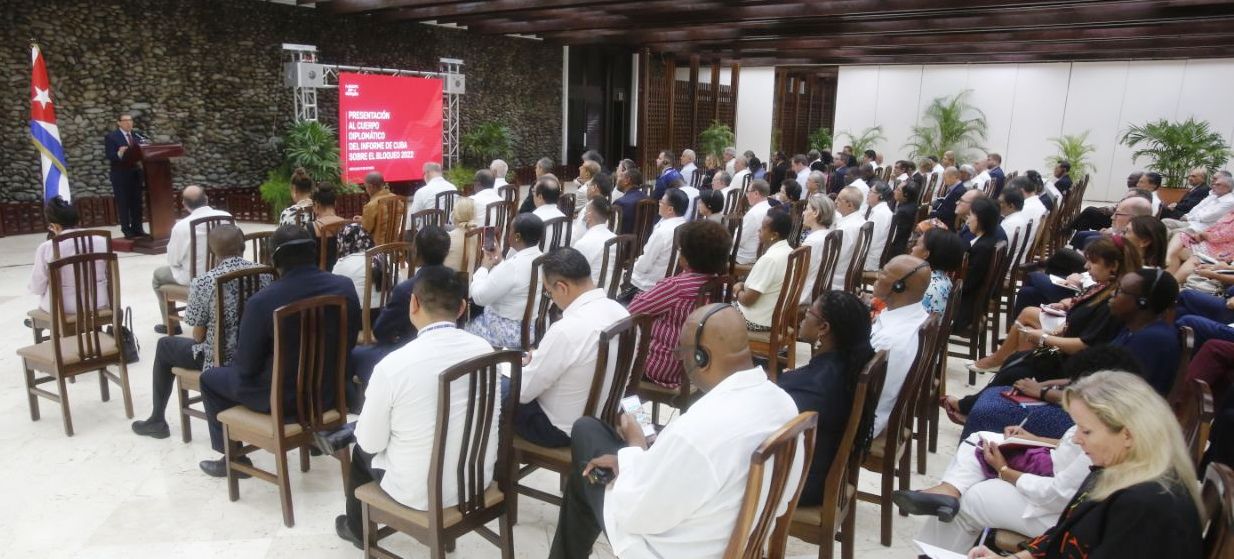
Report to diplomatic corps, October 19, 2022.
(With files from Cubadebate, Minrex)
Update to Cuba's Report on United Nations
General Assembly
Resolution 75/289 on
Ending the U.S. Blockade
(August 2021 -- February 2022)
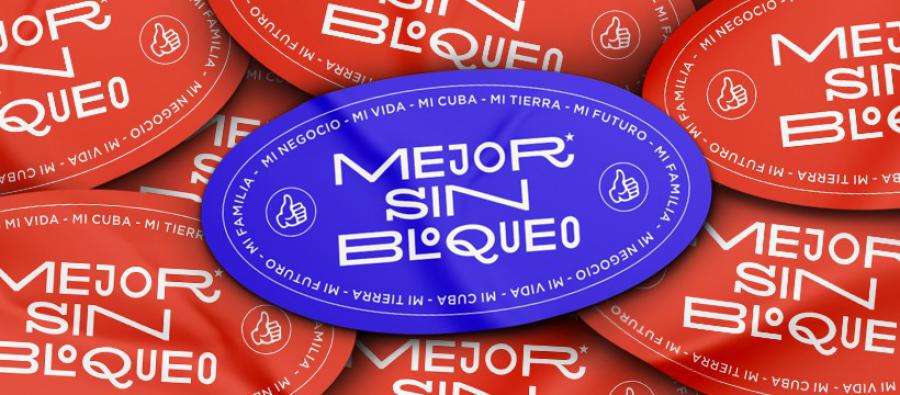
This document contains an update on Cuba's response to United Nations General Assembly (UNGA) resolution 75/289, entitled "Necessity of ending the economic, commercial and financial embargo imposed by the United States of America against Cuba."[1]
It includes the main effects caused by the blockade on Cuba from August 2021 to February 2022.
The combined effects of a multidimensional crisis at a global level in the energy, food, environmental and transportation sectors, and the accumulated impact of two years of the COVID-19 pandemic, have shaped a complex international context.
Inserted in this reality, Cuba has had to face, on top of that, the unprecedented tightening of the U.S. blockade, which includes additional very aggressive measures imposed during the administration of Donald Trump and which, for the most part, are still in force as a continuation of the policy of maximum pressure against the country.
Since 2019, the blockade has escalated to a qualitatively more harmful and inhumane dimension, with a reinforced extraterritorial component.
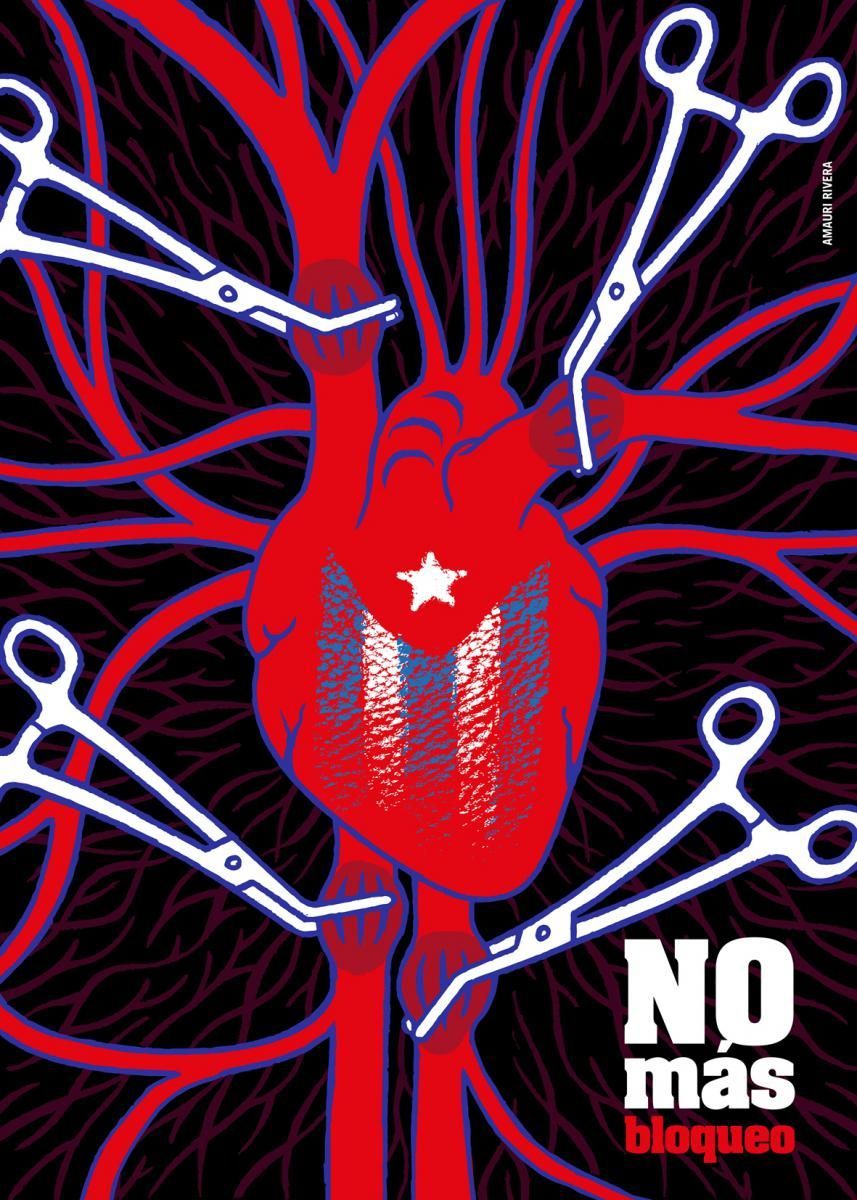 The
lawsuits filed under Title III of the Helms-Burton Act,
the persecution
of companies, ships and shipping companies that send fuel
supplies to
the country, the arbitrary and unjustified inclusion of Cuba on
the
State Department's List of State Sponsors of Terrorism, the
attack on
all sources
of income and foreign currency entering the country, the
intimidation
of third parties and the reinforcement of pressure on
governments,
banking institutions and businessmen around the world, have been
consolidated as an essential part of the U.S. strategy to
isolate Cuba
and provoke economic
disruption.
The
lawsuits filed under Title III of the Helms-Burton Act,
the persecution
of companies, ships and shipping companies that send fuel
supplies to
the country, the arbitrary and unjustified inclusion of Cuba on
the
State Department's List of State Sponsors of Terrorism, the
attack on
all sources
of income and foreign currency entering the country, the
intimidation
of third parties and the reinforcement of pressure on
governments,
banking institutions and businessmen around the world, have been
consolidated as an essential part of the U.S. strategy to
isolate Cuba
and provoke economic
disruption.
The continued full application of the Helms-Burton Act, including the authorization to file lawsuits in U.S. courts under its Title III, further expanded the scheme to hinder Cuba's economic, commercial and financial relations with third countries. As of the end of July 2022, 37 lawsuits were pending in U.S. courts under this extraterritorial law.
Cuba's permanence on the List of State Sponsors of Terrorism has reinforced the deterrent and intimidating impact of the blockade, as well as the country's difficulties in engaging in international trade and financial operations. This has resulted in the closing of contracts, loss of relations with banking entities that usually worked with Cuba, indebtedness, delays in the sending and receiving of funds and goods, among other difficulties, with incalculable costs and consequences for the Cuban people and economy.
Under conditions of a true economic war, the U.S. government has unleashed a pernicious media campaign in an attempt to destabilize the country. They resort to lies, slander, manipulation of data, images and the most diverse methods of unconventional warfare, to generate political destabilization and the so-called "regime change", in clear violation of the principle of non-interference in the internal affairs of States.
They have appealed to the feelings of intentionally targeted audiences. They placed our children, youth and artists at the center of the media barrage. They promoted artificial leaders, fabricated pretexts for the failed rehearsal of a humanitarian intervention, encouraged irregular migration and displayed a misleading narrative in order to position the false image of a government in crisis, repressive and unstable, incapable of responding to the demands of its population.
For these activities, the U.S. government has allocated approximately $20 million annually. The programs are operated under Section 109 of the Helms-Burton Act, which authorizes the U.S. President to provide assistance and other support to individuals and non-governmental organizations in support of Cuba's "democratization" efforts.
The measures on Cuba announced last 16 May by the administration of Joseph Biden regarding the coercive design imposed during Donald Trump's term of office are very limited in nature. In essence, they include the following provisions:
- Gradual and limited resumption of immigrant visa procedures at the U.S. Embassy in Havana for specific categories.
- Authorization of regular and charter flights to and from nine international airports in the country, in addition to Havana.
- Elimination of the limit of 3,600 annual flight frequencies to Havana and authorization of private charter flights to the entire country.
- Authorization of "people-to-people" group travel, under the general license for educational travel.
- Elimination of the $1,000 per quarter limit on family remittances and authorization of non-family remittances.
These regulations do not address the most harmful aspects of the blockade nor do they reverse the most aggressive measures adopted by the Donald Trump's administration.
The prohibition on regular bilateral trade and on importing goods containing more than 10 percent of U.S. components from third countries remains unchanged. The List of Restricted Cuban Entities and the Prohibited Accommodations List, the actions to prevent the transfer of fuel, as well as the inclusion of Cuba on the State Department's List of State Sponsors of Terrorism remain in force.
The ban on the use of the U.S. dollar in Cuba's international transactions is maintained, as well as the impossibility of using the U.S. financial system to carry out such transactions, when the origin and destination of the transfers is a Cuban entity and a third country.
All of this generates substantial losses due to variations in exchange rates between the U.S. currency and the currencies of third countries in which collections and payments are made, as well as other additional costs.
For U.S. citizens, travel to Cuba is still prohibited. It is only possible to do so by means of licenses established in the regulatory framework of the blockade, with numerous restrictions. The measures do not authorize individual "people-to-people" educational trips, an important limitation that requires travel in groups and under the auspices, supervision and legal responsibility of a U.S. organization.
Similarly, the resumption of immigration services at the U.S. Embassy in Havana has so far been gradual and very limited. The U.S. Embassy in Georgetown, Guyana, remains the main consular processing center for Cuba. This affects citizens and families of both countries and contributes to stimulating irregular emigration.
Regarding remittances, it remains impossible to carry out these transactions through formal and institutional channels, while U.S. processing entities are prohibited from conducting transactions with Cuban companies included in the Restricted Entities List.
The current U.S. government presents these administrative regulations as "support for the Cuban people"; however, its hostile and demagogic actions contradict any real interest in resuming the path initiated during the presidency of Barack Obama, which led to notable advances in the bilateral relationship.
The determination to generate material shortages, scarcity, sow discouragement, dissatisfaction and cause damage to the Cuban people, as well as to hinder the possibilities of economic progress in a scenario of serious global crisis, persists.
Between August 2021 and February 2022 alone, this policy caused losses to Cuba in the order of 3.8 billion dollars, a figure 49 percent higher than that reported in the previous period (January-July 2021). This record amount, in just seven months, is a reflection of the intensified impact of the blockade on Cuban exports, mainly in the tourism sector, the merciless persecution of the country's banking-financial operations, the costs of geographic relocation of trade, the effects on production and services provided to the population and the obstacles to access advanced technologies.
It is estimated that the GDP could have grown by 4.5 percent in those seven months if the blockade had not existed, which projected to one year represents around 8 percent.
Taking into account the damage reported between January-July 2021, in the first 14 months of Joseph Biden's administration alone, the damages caused by the blockade reached more than 6.3 billion dollars, which represents an impact of more than 454 million dollars a month and more than 15 million dollars a day.
At current prices, the accumulated damages during six decades of application of this policy amount to over 154 billion dollars. Taking into account the behavior of the dollar against the price of gold on the international market, the blockade has caused quantifiable damages of more than 1.391 trillion dollars.
As a result, the performance of the Cuban economy has experienced extraordinary pressure that is manifested in industry, services, retail trade, food and medicine shortages and the deterioration of the level of consumption and general welfare of the population.
In recent months, work has been systematically carried out in the search for energy stability under very complex conditions, as the availability of generating plants has been limited due to the lack of fuel, spare parts and other essential resources for their repair and maintenance. The few suppliers that have decided to keep supplying Cuba with these products have increased their prices considerably according to the country risk.
Between August 2021 and February 2022 alone, damages to the energy and mining sector amounted to more than 185 million dollars. This figure exceeds by almost 50 million dollars the one reported between January and July 2021.
The data do not illustrate the true impact of these affectations on the daily life of Cubans, nor the constant stress generated by the intermittent interruptions to the electric service, despite the government's will and effort to achieve a prompt and effective solution to this problem.
During this period, the German company Brüel & Kjær Vibro GmbH, supplier of the technology for the vibration monitoring systems of the thermal turbines of the National Electric Union, stated that it would not enter into contracts with the Cuban importing company ENERGOIMPORT if the latter did not make all the payments in advance, while its bank recommended it not to operate with Cuba due to the application of Title III of the Helms-Burton Act.
In October 2021, the French supplier CNIM informed the trading company DEVEXPORT that it could not continue with the contracts for spare parts for the Antonio Guiteras Thermoelectric Power Plant since, after an internal financial restructuring, the Group had committed not to finance, facilitate or develop activities with any country subject to the sanctions of the Office of Foreign Assets Control (OFAC) and the U.S. State Department.
The blockade violates the right to life and health of all Cubans. The impact of this policy is reflected in the shortage of essential products for the consumption of the population, as well as the difficulties of the national industry to acquire the necessary supplies for the production of pharmaceuticals and other essential services.
Cuba is capable of producing more than 60 percent of its basic list of medicines; however, these levels have not been guaranteed for months due to the impact of the blockade on the country's payment capacity, the impossibility of accessing medical technologies with more than 10 percent of US components, the need to resort to alternative transportation routes with a high additional cost and the growing refusal of financial and banking institutions in various countries to process transactions with Cuba, which has prevented transactions with suppliers of these goods.
This is illustrated by the impossibility of making a purchase of insulin from the Danish company Novo Nordisk, due to the refusal of the Danske Bank to accept bank transfers. The bank alleged that it could not receive funds from the Banco Financiero Internacional (BFI), since it is a Cuban entity sanctioned by OFAC.
In the midst of the confrontation with COVID-19, the blockade hindered the arrival of syringes to the country to support the vaccination process. Negotiations with a foreign supplier had to be interrupted because the British bank HSBC informed the supplier that it could not carry out payment transactions destined for Cuba.
During the major pandemic peak in the country in 2021, not a single measure of blockade relief was applied. This policy hindered the arrival of donations; the acquisition of cylinders, spare parts and other components necessary for the supply of medical oxygen; in addition to the purchase and transportation of materials indispensable for the prevention, diagnosis and treatment of this disease, as well as for the research, production and evaluation of vaccine candidates and Cuban COVID-19 vaccines.
As a result of the blockade, the Center for Genetic Engineering and Biotechnology (CIGB), producer of the Cuban COVID-19 vaccine Abdala, reported losses of over 190 million dollars. For the Finlay Vaccine Institute (IFV), producer of the Soberana 02 and Soberana Plus vaccines, this policy generated difficulties in 20 operations, 11 corresponding to supplies, 6 to reagents and 3 to equipment from U.S. manufacturers.
Clinical studies of autoimmune diseases, such as psoriasis, multiple sclerosis, as well as neurodegenerative diseases, have not been able to start because the necessary drugs, which are therapeutic standards in the world, are not available for Cuban patients.
These severe limitations are detrimental to the quality of the services provided to the Cuban population, as they generate delays, waiting lists to receive specialized medical care, increased hospital stays and other negative effects.
Between August 2021 and February 2022, the effects on production and services in the agricultural sector, the obstacles in monetary-financial operations, the additional costs due to the geographic relocation of trade and other obstacles to acquire technologies and fuels, seriously impacted the production and acquisition of food in Cuba, generating damages of more than 270 million dollars in the area of agriculture.
At this stage, a considerable group of banks refused to process payments to suppliers of the Cuban food importer ALIMPORT for products such as soybeans, vegetable fat, pork feed, and sausages, among others.
In addition to the above, there are the obstacles associated with maritime transportation that have an impact on our entire logistics chain. In this regard, the MSC shipping company, which transported a considerable volume of our cargoes, mainly from ALIMPORT, has continued not to provide service, which has hindered operations with traditional markets.
Due to the lack of fuel, irrigation, land preparation, phytosanitary protection and the movement of agricultural personnel have been increasingly affected. Similarly, difficulties persist in the acquisition and/or repair of equipment necessary for the agricultural and pre-industrial process and transportation in general.
During the period analyzed, the Cuban company TRANSIMPORT made 518 requests for automotive equipment, tractors, batteries, engines, forklifts, parts and pieces, among others. It only received 9 percent of the demands made to foreign suppliers.
The blockade affects the Cuban private enterprise as much as the state enterprise. There are plenty of examples of computer tools that are not accessible to national developers just because they are Cuban. They are also hindered from accessing external financial mechanisms, opening bank accounts abroad and the possibility of using payment and e-commerce platforms that are forbidden to Cuba.
The impact of the blockade is not only limited to the Cuban reality. By means of pressure and the use of scandalously anti-democratic and interfering practices, Washington seeks to make the rest of the countries and international organizations abide by its political decisions regarding Cuba.
In November 2021, it was known that the U.S. Embassy in Vienna sent a letter to the Secretariat of the International Atomic Energy Agency (IAEA), explicitly requesting that the funds allocated by its government to the organization for nuclear security activities not be used in cooperation projects with Cuba.
During the period, a total of 100 foreign banks were identified as being involved in 261 actions of closing accounts and established banking contracts, returning transactions, refusing to create accounts, canceling passwords for the exchange of financial information through the Society for Worldwide Interbank Financial Telecommunication (SWIFT), among others. As a consequence, the effects on the banking-financial sector amounted to 260.8 million dollars, a figure that exceeds by 93 million dollars the one reported between January and July 2021.
Likewise, dozens of Cuban diplomatic missions in the world have lost their relationship with the banks that traditionally provide them with services, due to their fear of reprisals from the U.S. government.
As a result, the country has encountered obstacles in paying its contributions to various international and regional organizations, despite the Cuban government's willingness to honor its financial commitments.
In mid-2021, the Société Générale Bank decided to close the accounts of the permanent delegation of Cuba to UNESCO and the Cuban Embassy to the French Republic, which has substantially affected the normal functioning of both diplomatic offices. The announcement of the definitive closure of the aforementioned accounts is part of the blockade policy towards Cuba, while at the same time it violates Regulation No. 2271/96 adopted by the European Council to counteract its extraterritorial effects.
Another example was made known in January of this year, when the Dutch multinational bank Internationale Nederlanden Groep decided to block all donations to the Progressive International delegation that was to travel to our country as part of an initiative to support access to vaccines against COVID-19 worldwide. The bank claimed that the decision was made on the basis of risk assessments in light of the U.S. sanctions imposed on Cuba.
The digital lodging platform Airbnb Payments, Inc. had to pay in early 2022 a fine of 91,172 dollars imposed by OFAC, for accepting payments from Americans who traveled to Cuba outside the categories authorized by the White House.
Former President Barack Obama's own Deputy National Security Advisor, Ben Rhodes, described the fine as "stupid, counterproductive and Trumpian" for denying Americans the ability to facilitate income directly to Cubans and establish connections between the two peoples.
Recently, the country experienced moments of extreme anguish and tension as a result of a major fire at the supertanker base in the province of Matanzas, which caused regrettable human and material losses. While dozens of nations, friends and Cubans living abroad showed their solidarity with Cuba, the blockade continued to hinder the arrival of international aid to the country.
The National Association of Italy-Cuba Friendship was unable to make a transfer to the account of the International Financial Bank (BFI, by its Spanish initials) destined for donations in case of emergency because the BPM bank and the Milan branch of Banca Etica alleged that the BFI was on the list of entities sanctioned by the U.S. State Department.
The blockade constitutes a massive, flagrant and systematic violation of the human rights of the Cuban people.
It is an act of economic warfare in times of peace. It represents the main hindrance on the economic and social development of the country, as well as on the implementation of the 2030 Agenda and its Sustainable Development Goals.
Its pretensions are illegitimate and illegal, in violation of the United Nations Charter and international law.
The limited changes announced on 16 May 2022, responded to the continuous denunciation of the Cuban people and government, to the constant demands within the U.S. society and the community of Cubans living abroad to put an end to the blockade, as well as to the almost unanimous position of the countries of the world in rejection of this cruel system of unilateral coercive measures.
Three decades after the first resolution of the United Nations General Assembly against the blockade, the U.S. government persists in ignoring the numerous pronouncements of that international forum calling for the elimination, without conditions, of its failed, unilateral and criminal policy against Cuba.
In this context of special complexity, Cuba and its people are deeply grateful for the expressions of solidarity received, and trust that they will continue to count on the support of the international community in their legitimate demand to put an end to this unjust policy.
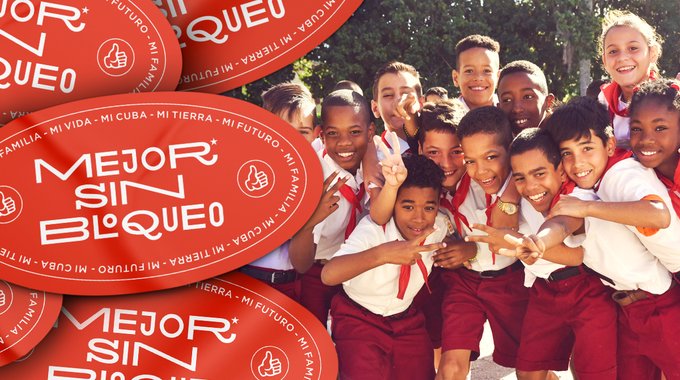
Note
1. Cuba's response to Resolution 75/289 of the United Nations General Assembly entitled "Necessity of ending the economic, commercial and financial blockade imposed by the United States of America against Cuba" (January - July 2021) can be found here.
(Minrex, October 19, 2022)
Events in Support of Cuba and
UN Vote on U.S. Blockade
SATURDAY, OCTOBER 29
Ottawa
Puentes
de Amor/Bridges of Love Caravan
11:00 am
Starts at Cuban Embassy, 388 Main St.
Organized by: Ottawa-Cuba Connections,
Association d'amitié Outaouais-Cuba
SUNDAY, OCTOBER 30
Montreal
Bridges of Love Caravan
Starts: 11:00 am
Ends: 12:00 pm
Starts from parking lot of Patro le Prevost Community
Centre,
7355 Christophe-Colomb Ave.
Toronto
Rally Against the U.S. Blockade
1:00-2:00 pm
Across from the U.S. Consulate, 360 University Ave
Winnipeg
Rally
1:00-2:00 pm
River and Osborne
Vancouver
Monthly Car Caravan
12:00 pm
Call 604-780-4029 for location
UNITED STATES
New York City
Rally and March
Saturday, October 29 -- 12:00 pm
Times Square
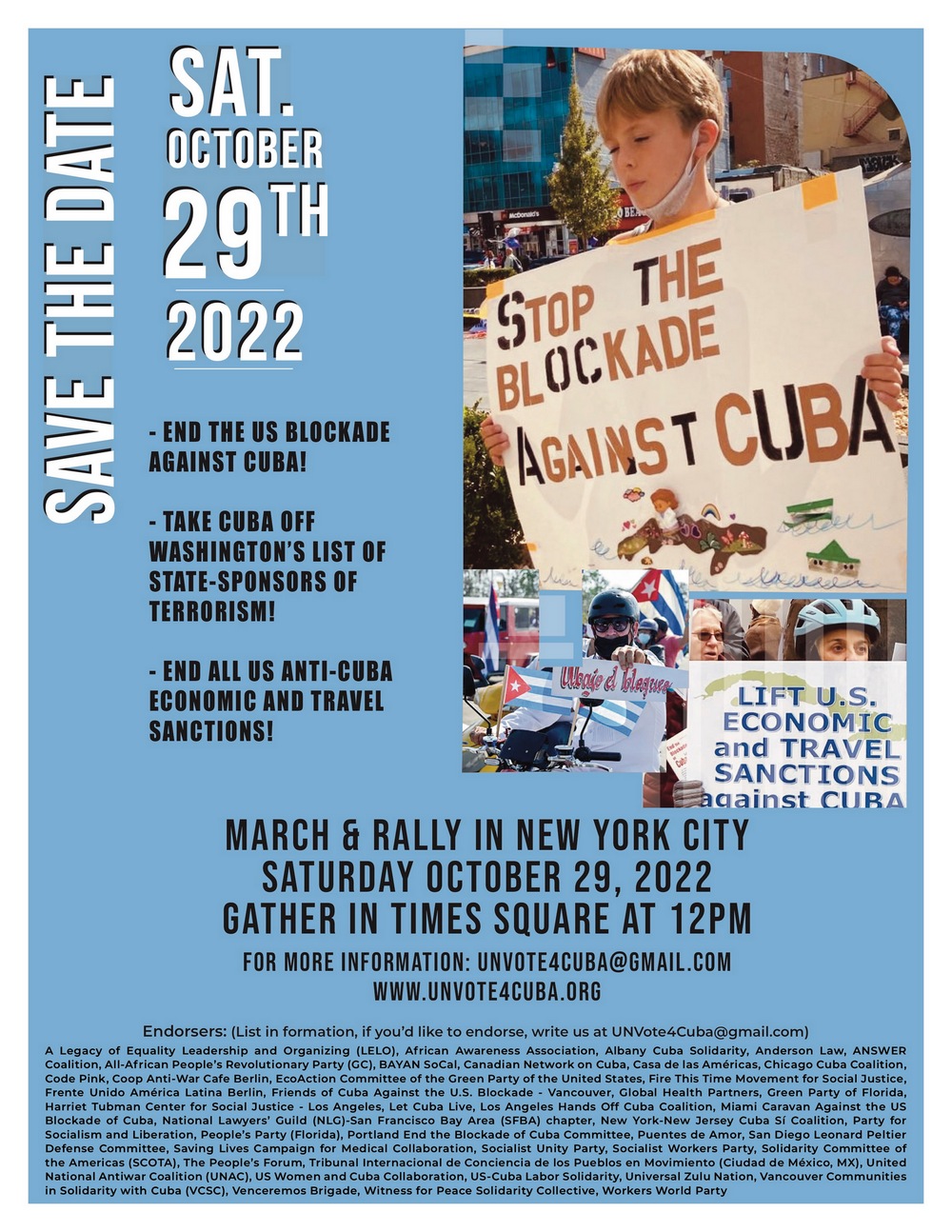
For full list of events across the U.S. visit:
www.unvote4cuba.org
WORLDWIDE
24-Hour Global
Online Picket
Starts: Wed., November 2
-- 8:00 pm (Havana Time/EDT)
Ends: Thurs., November 3 -- 8:00 pm (Havana Time/EDT)
To register: www.tinyurl.com/24hr4Cuba
For information: www.unvote4cuba.org
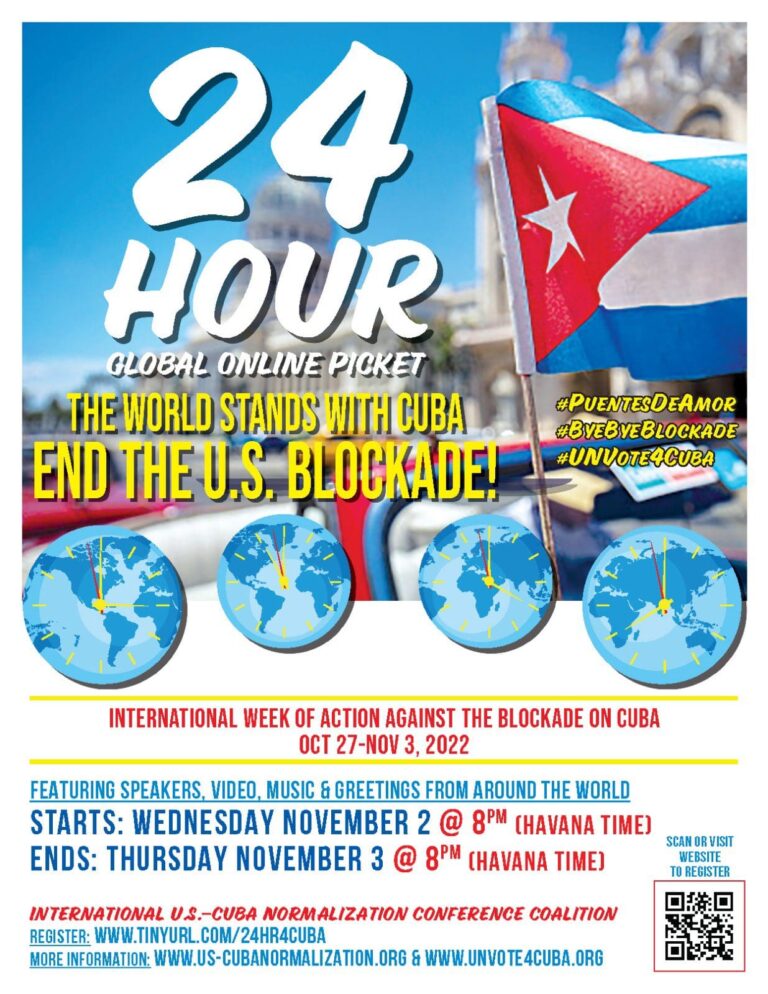
(To access articles individually click on the black headline.)
Website: www.cpcml.ca Email: editor@cpcml.ca

